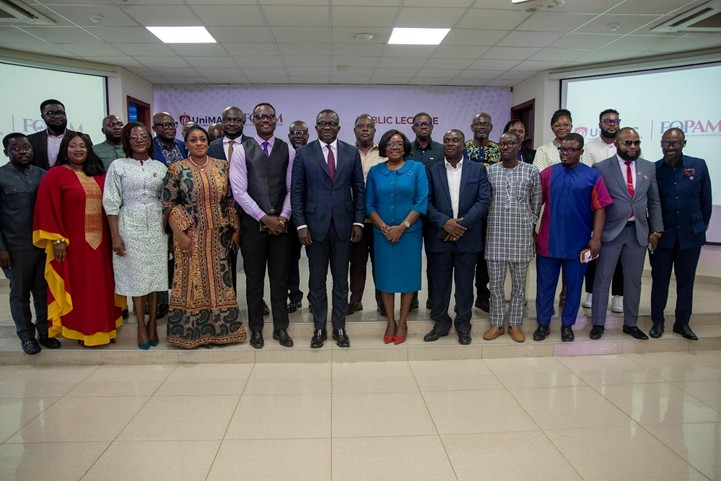
The University of Media, Arts and Communication (UniMAC) on Thursday, June 26, 2025 hosted the former Minister for Food and Agriculture and the current Member of Parliament (MP) for Abetifi, Dr. Bryan Acheampong, to a public Lecture on the topic, “AI Disruptions and the Future of Work: Readiness of Our Youth.”
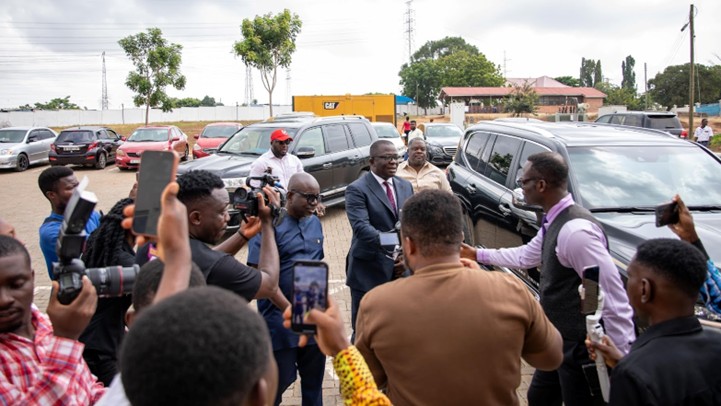
Dr. Acheampong’s selection for the topic leads credence to his expertise in Information Technology as he holds a PhD in Information Technology from the University of Ghana Business School, his career spanning politics, national security and entrepreneurship, and his contributions in driving social impact.
The Director of Public Affairs of UniMAC, Ms. Nana Efua Rockson, moderated the Public Lecture. She not only read the profile of the Guest Speaker, but also highlighted the key points and “quotable quotes” in the lecture for quick recall at the end of Dr. Acheampong’s two and half hour’s delivery, to get the audience to appreciate the insights given and to guide their questions.
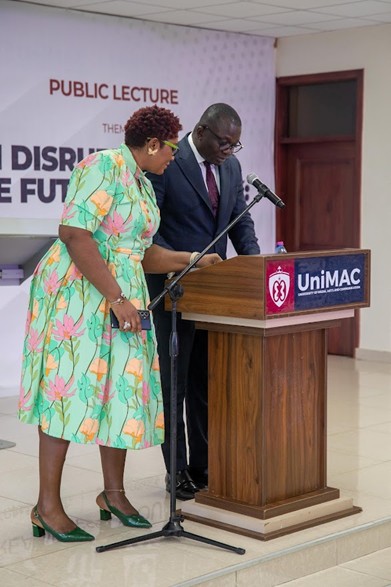
Delivering the keynote address to usher in the Guest Speaker, the Rector of the Institute of Journalism, Prof. Christiana Hammond, admitted that delivering a lecture on AI to GenZ students was ineffectual as everybody was familiar with AI, and perhaps better users of the tools. She however, expressed the importance of the lecture as, ‘addressing the missing gap in the role of Higher Education Institutions (HEI’s) in preparing the youth for AI disruptions”. She stated emphatically that, “we need to be intentional in learning to use AI tools. If we do not acquire the needed skills to enable us use AI effectively, very soon AI will take over our jobs.”
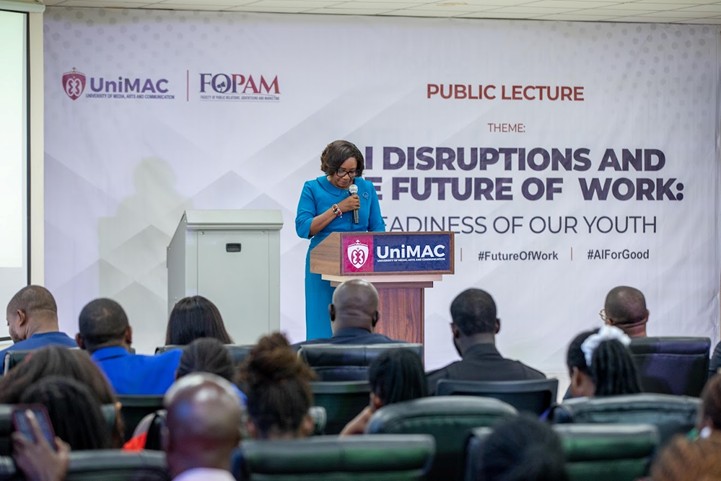
Mounting the dais to deliver the lecture, Dr. Acheampong, expressed nostalgia of returning to UniMAC, where he earned a certificate in Public Relations, Advertising, and Marketing in 2014 (then Ghana Institute of Journalism). He described the moment as a homecoming in the remarks that, “I might have used ChatGPT to help with my PR briefs had it existed back then,” before turning to a thought-provoking message about AI’s power to both disrupt and uplift.
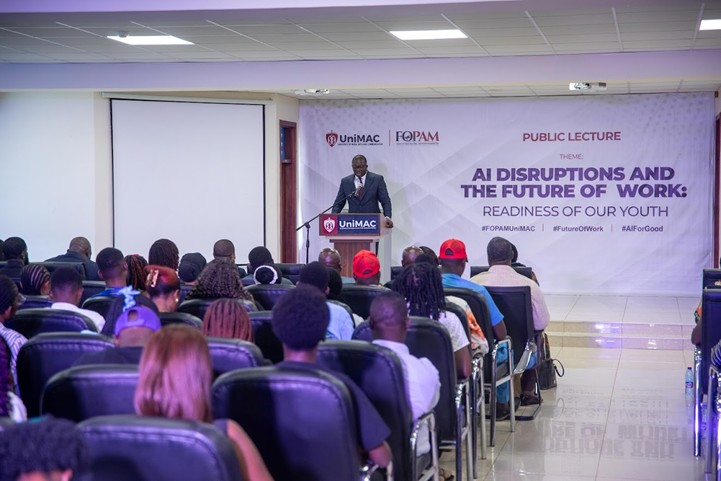
In interrogating and unpacking the theme for the lecture, Dr. Acheampong acknowledged the fact that AI is shaping decisions across sectors, giving practical examples in the health, financial, agriculture, education, creative and media sectors, mentioning but a few.
He cited initiatives from his tenure as Minister of Agriculture, including the launch of the Ghana Agriculture and Agribusiness Platform (GhAAP), which used digital tools to streamline farm operations. He explained how AI can take such platforms further with crop disease diagnosis apps, predictive price models, and smart logistics—all vital to modernise farming.
In education, Dr. Acheampong highlighted his own academic research, including a 2023 co-authored study on ChatGPT’s use in Ghanaian universities.
The study found that students were more likely to embrace AI when they trusted its purpose and saw its usefulness.
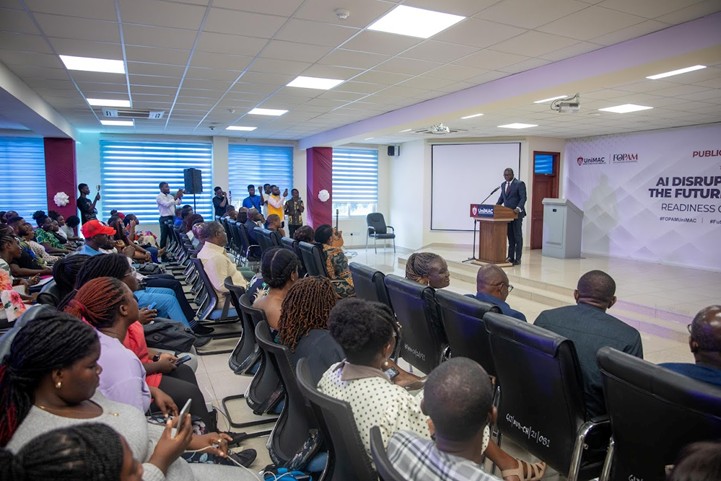
Despite these rapid advancements, Dr. Acheampong zoned in on Ghana with the question, “where does Ghana stand in this rapidly changing landscape?” He stated that Ghana has made admirable strides in digital inclusion. Ghana has improved digital penetration, made significant reforms in mobile money infrastructure, and launched the Ghana card as a biometric foundation for digital identity. He shared further examples in the education, retail and commerce, banking and agriculture sectors, where Ghana has made good process with AI and stated that, “AI is not coming, it is here. The disruption is not distant, it is now”.
Dr. Acheampong juxtaposed the gains of AI to the complexities it presents by expressing that, “AI demands more than internet access; it requires data ecosystems, algorithmic governance, skilled talent pipelines and public trust to build a robust foundation for AI to thrive in Ghana”. He made a call to action for Ghana to embrace AI not as a distant innovation, but as an active force that is already transforming industries from agriculture to media. “We must not only teach AI, but demystify it,” he said, calling for updated curricula, teacher training, and experiential learning environments where students can use AI tools creatively and ethically.
On the focus on the world of work, Dr. Acheampong boldly stated that, “the next generation of Ghanaian workers will not compete with machines; they will collaborate with them. Our educational system must pivot from rote learning to problem solving, coding, algorithmic thinking, and ethical reasoning. Institutions like UniMAC can lead the way by designing interdisciplinary AI literacy programmes – not just for students, but for media professionals, civil servants, and entrepreneurs”.
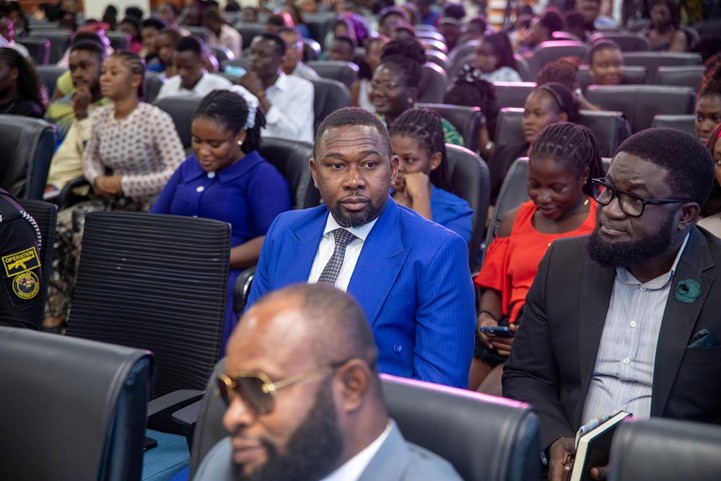
As anticipated, Dr. Acheampong turned his attention to UniMAC’s core students in communication, media and arts. He described this sector as Ghana’s “AI goldmine,” with opportunities to automate editing, optimise audience targeting, detect misinformation, and tell stories more powerfully across digital platforms. “AI won’t replace your creativity,” he told the students. “But it will reshape how it’s monetised, protected, and distributed. AI can help Ghana’s creative economy scale globally”.
At the heart of his lecture was a strategic framework for Ghana’s AI future based on three pillars: trust in systems; adaptive human capital; and institutional readiness. His proposals included the creation of micro-credential programmes in AI, public-private partnerships with tech startups, and national campaigns to build digital literacy from the grassroots up. He foretold that, “Ghana’s digital future will not be defined in Silicon Valley. It will be shaped here—by the students, civil servants, creatives, and entrepreneurs who know this land and its needs.”
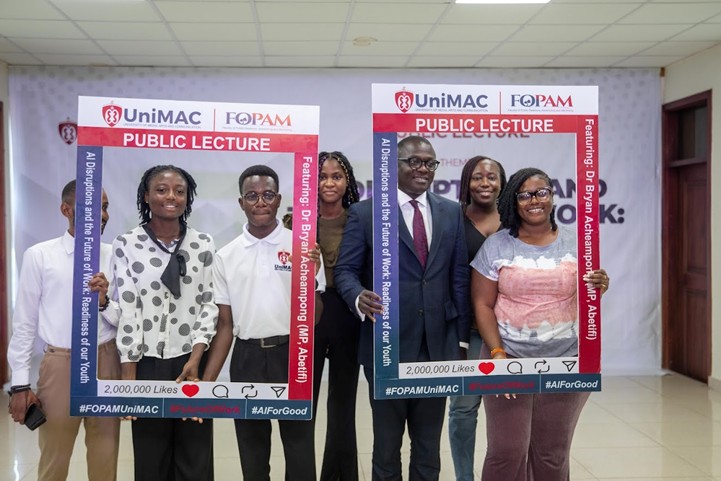
Students were given the platform to ask questions, and to which Dr. Acheampong answered poignantly and related to the students at their levels of communication. The glee and satisfaction on the faces of students were seen as they took turns to pose for photographs with the Guest Lecturer.
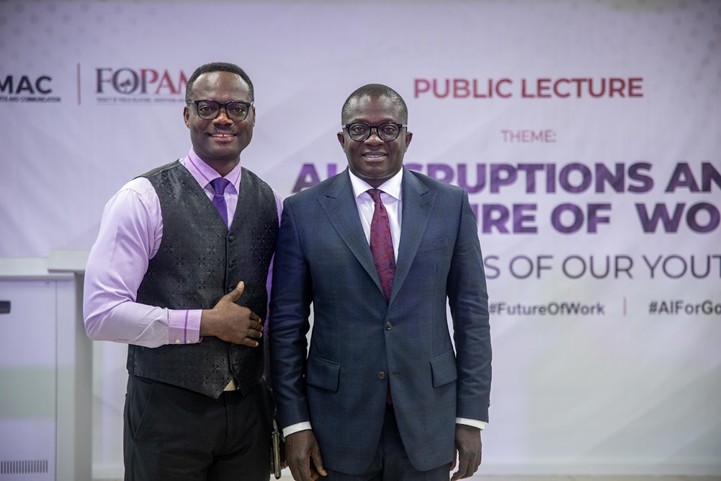
In his closing remarks, the Dean of the Faculty of Public Relations, Advertising and Marketing (FOPAM) at UniMAC’s Institute of Journalism, Rev. Yaw Odame Gyau, paid glowing tribute to the Guest lecturer and expressed profound gratitude to Dr. Acheampong for not only honouring the invitation but delivering a scholarly lecture.
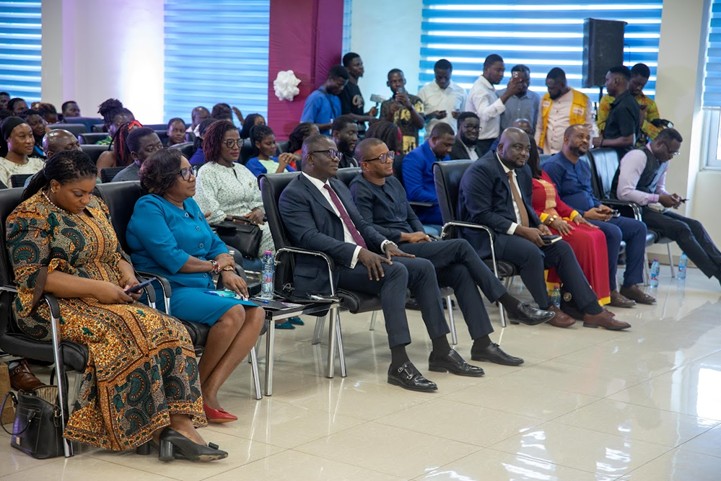
The Public Lecture had the Pro Vice-Chancellor, Prof. Winston Abroampa representing the Vice-Chancellor in attendance, other Rectors of the UniMAC’s Constituent Institutes, Faculty, Management, staff and students of UniMAC, all at the auditorium.
In support of Dr. Bryan Acheampong, the Guest Lecturer had an entourage to grace the lecture which included former Ministers of State, Former Director Generals and Chief Executive Officers in Ghana.
This Public Lecture, which forms part of UniMAC’s Institute of Journalism’s (UniMAC-IJ) Distinguished Speakers Series, was organised by the Programmes Coordinator of the Faculty of Public Relations, Advertising and Marketing (FOPAM), Dr. Noel Nutsugah. These series are set to bring experts, lecturers, policymakers, communicators, media and creative stakeholders together with students to interrogate topical issues affecting today’s professional workspace.
